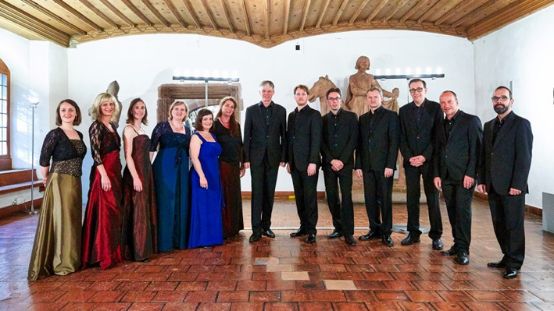"Young Switzerland"
The Swiss choral literature of the early 20th century is rich and still little known. The Basel Madrigalists bring this heritage back to the podium.

Every day, Raphael Immoos, Professor of Choral Conducting at the Basel Music Academy and Director of the Basel Madrigalists, enters the Rudolf Moser House at Steinengraben 21, where his conducting room is located. Until recently, he was not familiar with the work of the Basel composer (born in 1892), who grew up in this house. Immoos contacted the Rudolf Moser Foundation, which is looking after the composer's estate. To his astonishment, he found only 120 a cappella pieces, many of them for women's choir, men's choir and mixed choir. Moser, like Othmar Schoeck before him, had studied with Max Reger in Leipzig and later gained further inspiration from Hans Huber and Hermann Suter in Basel. Felix Weingartner, then director of the Basel Conservatory, brought Moser to his institute in 1928 to teach composition and theory. Moser's students included Walter Müller von Kulm, Paul Sacher and the violinist Yehudi Menuhin.
Starting with Moser, Immoos discovered a whole series of other Swiss composers - most of them with a connection to Basel - who had devoted themselves intensively to choral singing. In 1930, the "Zürcher Liederbuchanstalt" published the volume New songs for mixed choir a cappella. The 62 pieces bear witness to an extraordinarily rich choral oeuvre in the first half of the 20th century, which is predominantly indebted to the late Romantic style, long reviled as kitschy and epigonal.
In the second chapter of this volume, Rudolf Moser and his two contemporaries and friends Albert Moeschinger and Conrad Beck are assigned to the composers' group "Young Switzerland".
An era of upheaval
The Madrigalists performed on June 14, 2017 at the Museum Altes Klingental as a chamber choir with three sopranos, altos, tenors and basses. The program opened with two songs by Hermann Suter (Winter's end, Evening blessing), in which the choir was able to call up the entire dynamic range between full choral sound and fine pianos. This was followed by Joseph Lauber - also a teacher of Moser's A day in May with cleanly executed harmonic frictions. With Hans Huber's Come to the source (1886), the song to which the program owes its title, was a first highlight with three quartets divided in space.
The Moser block with the four songs The source (Novalis), Lost (Theodor Storm), The current and Hunter's song (Eduard Mörike) made it clear why this composer was placed at the heart of the program. The folk song style is combined here with dense harmonies and artfully applied modulations. Conrad Beck's songs ranged between Romanticism (Solution1923) and already more progressive sounds in the Evensong (1932). Albert Moeschinger, who came to terms with many influences in his long life as a composer, goes into detail in Transience (1930, text: Martin Opitz) was just as creative with the Romantic tonal language as Othmar Schoeck. After Schoeck's traditional A little bird sings in the forest (1906/07) is available at 's song from the year 1931.
Pioneering sounds
Benno Ammann is by far the most progressive of all the composers to be heard this evening. The difficult but gripping songs Firnelight, Wedding song (both by Conrad Ferdinand Meyer) and Night in the village (Gian Bundi) foreshadowed Ammann's intensive involvement with New Music in the 1950s with surprising whole tone steps and the abandonment of the conciliatory tonic at the end of the songs. Three folk songs (1932) based on Swiss-German texts by Meinrad Lienert provided a humorous conclusion.
The Basel vocal institution "Madrigalisten" was under the direction of its founder Fritz Näf until four years ago and will be celebrating its fortieth anniversary next year. Plans include an anniversary CD with the enchanting Swiss song treasures discussed above, the rediscovery of which can be highly credited to the chamber ensemble and its conductor. The vocal culture of the Basler Madrigalisten is characterized by good text comprehensibility, a wide dynamic range and convincing intonation. The ensemble thus did full justice to the demanding works on this evening.








